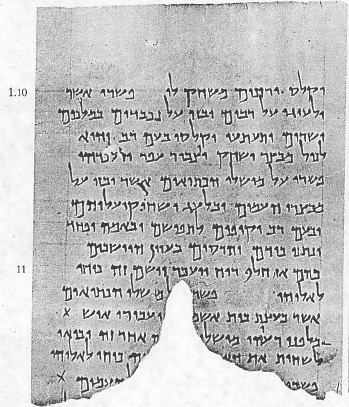
![]()
The Pesher to Habakkuk
Page 4
Chaper 1:10 to 14

![]()
The first two words in verse 10 are lost in the lacuna at the bottom of the preceding page. On the first line on page 4 above there are 4 words in verse 10 that correspond to the 2nd through 5th words in verse 10 followed by pesher. In the Hebrew text the pronouns and the verbs and the objective suffixes referring to Chaldean troops are all singular. Even though the translators all put "they" and "them" the Hebrew personifies the Chaldean force as "it" and "him" or "he." Also notice that the 7th stem verb "yitqalas" (3rd word in M text) is written as a 1st stem verb in the pesher or "yiqalas" or perhaps "ve-qalas" conj. + qal pf3ms. The rest of the verse is seen after the pesher beginning with the last word in line 3 (hu' ) and continues to the last word in the verse in line 4. A blemish in the page obsures the word slightly. In M it is "yilkedah" ip3ms + suf 3ms "he (they) conquered it (her)" In the pesher there seems to be an extra letter but it is probably "ve-yilkedehu" the yod looking like a waw and extended due to the blemish and the 3ms suf spelled "hu."And they shall deride the kings and make fun of the commanders, they shall make sport of every stronghold for they shall heap up dust and capture them.
Habakkuk 1:11
This verse is found intact except for slight variation. It begins with the 2nd word on line nine and ends with the 1st word on line 10 followed by a spatium and pesher. The 6th word on line 9 in the pesher is "ve-yasem" cj + imp3ms (and he put or placed). The M text has a different word "ve-'osem" beginning with aleph which never drops out. Also it is a participle meaning "doing wrong." In the pesher the object of "put" is "zeh" (this) In M the participle has no object and for zeh we find "zu" a more demonstrative form meaning that which. Thus the pesher lacks the word "offend" and rather has the sense that the translaters have arrived at. That is: "he imputes his power to his god." It is doubful that the word is mispelled in the pesher, dropping out an aleph, but is a different reading which may be preferable.
There are two peshers associated with this verse The last line on the page begins with peshru and the section is marked by a later editor by two x's enclosing the section which is similar to the Qa scroll, i.e. the x's mark the text to the right of the x's. See the section under marks in the Qumran Introduction.
Then shall he change his spirit and he shall pass over attributing this, his power, to his god
To read the translation of the entire page click here